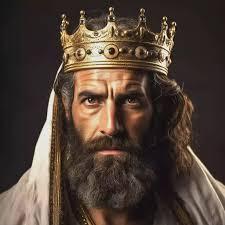Behold, Your King
First Samuel 9:15 to 10:16
Isra’el’s elders had asked for a worldly king, and ADONAI sent Sha’ul as His literal answer. Sha’ul was the messiah (anointed one) and king for unbelieving Isra’el. But through the bitter experiences that would follow, many among God’s people would cry for a true King who does God’s will and not the will of the world. In time, the LORD would provide for them a King and Messiah, and His coming would be in stark contrast to the coming of Sha’ul.

As Richard Phillips relates in his commentary on 1 Samuel, the day Ha’Shem provided His true King to Isra’el is remembered as Palm Sunday, when Messiah rode into Jerusalem amid cries of “Hosanna” (see the commentary on The Life of Christ, to see link click It – Jesus’ Triumphal Entry into Jerusalem as the Passover Lamb). It is striking that while Sha’ul came to Ramah, Isra’el’s chief worship center at that time, he came exactly opposite to Yeshua’s coming to Jerusalem. Messiah came riding on a donkey, Isra’el’s royal symbol of one who brings peace. Sha’ul, however, arrived as one who couldn’t find his donkeys! For all his impressive qualifications, Sha’ul simply was not able to be a true king for God’s people. While Sha’ul came to Isra’el with an impressive outward appearance that masked his incompetence, Yeshua appeared in a humility that veiled His divine majesty and power.
The more fundamental difference between Sha’ul and Yeshua was Sha’ul’s indifference toward righteousness before YHVH. This is the distinguishing feature of worldly kings and empires: a concern only for the pragmatic means of earthly success, with little or no thought of what ADONAI desires or thinks. All through the reign of Sha’ul, he will stumble over God’s commands, finding his own will more suitable. In the greatest contrast, Messiah is the King who perfectly obeys God’s Word and is filled with a passion for His righteousness. Yeshua would say: My food is to do the will of Him who sent Me and to accomplish His work (John 4:34). Sha’ul had a fleeting empowerment of the Ruach Ha’Kodesh. But Messiah, as ADONAI’s true Son, was fully and constantly filled by the Spirit of God. He who sent Me is with Me, Yeshua declared, He has not left me alone, for I always do the things that are pleasing to Him (John 8:29). The Spirit of the Lord is upon Me, Messiah preached, because He has anointed Me to proclaim the Good News to the poor (Luke 4:18, quoting Isaiah 61:1).
His perfect, personal righteousness qualified Yeshua to ride the royal donkey of peace into Jerusalem. Zechariah prophesied: Behold, your king is coming to you; righteous and having salvation is He, humble and mounted on a donkey, a colt, the foal of a donkey (Zechariah 9:9). Hebrews 1:8b-9 says: The righteous scepter is the scepter of His Kingdom. You have loved righteousness and hated wickedness; therefore ADONAI, Your God, has anointed You with the oil of gladness above your companions. Yeshua is the true King sent by YHVH to establish righteousness on earth, and in that righteousness to give eternal peace to all those who believe in Him as their Lord and Savior.
The Israelites had no choice but to accept Sha’ul as king. Their elders had rebelled against ADONAI by demanding a worldly king . . . and Ha’Shem gave them Sha’ul. But we have a choice. Everything that Sha’ul represented is still alive today, enthroned in the worldly seats of power and calling us to submit and worship it. We have a choice between Sha’ul, whose name identifies him as the king that the unbelieving world asked for, and Yeshua, whose name identified Him as the Savior sent by the LORD to deliver His people from the penalty and power of their sins (Matthew 1:21). Our choice – to embrace the world or trust in Messiah – will determine our kingdom: either an earthly reign of unrighteousness and fleshly power, or a heavenly Kingdom of righteousness and peace.216



Leave A Comment